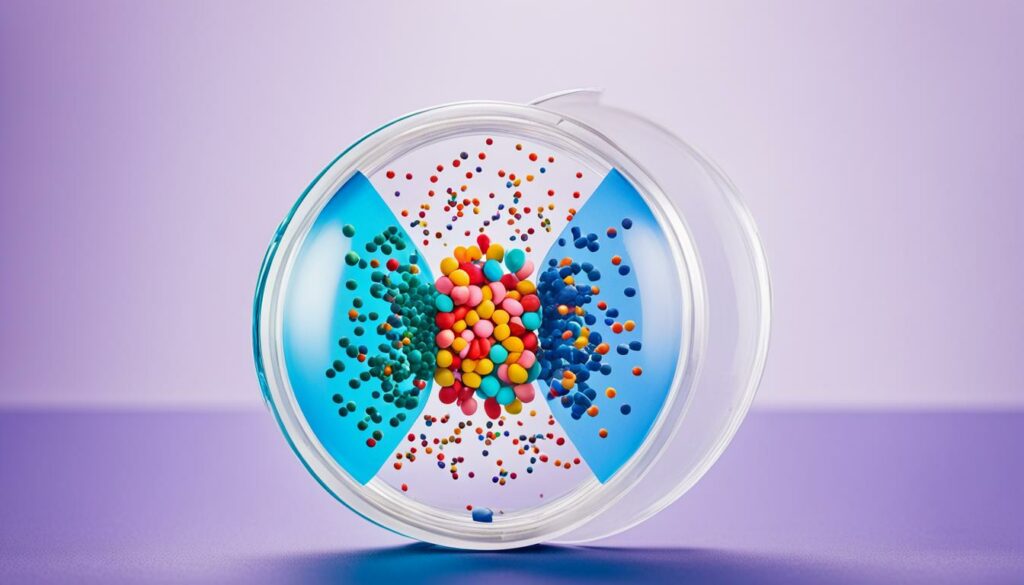Did you know that 60% to 80% of children and teenagers experience reduced hyperactivity, improved focus, and decreased disruptive behavior when taking medication for Attention Deficit Hyperactivity Disorder (ADHD)? That’s a significant impact. However, it’s important to weigh the pros and cons before deciding whether medication is the right choice for you or your child.
Key Takeaways:
- ADHD medication can be effective in reducing hyperactivity, improving focus, and decreasing disruptive behavior.
- The long-term benefits and risks of ADHD medication are not well-studied.
- It’s essential to receive a proper diagnosis from a healthcare professional with expertise in ADHD.
- Alternative treatment options, such as behavioral therapy and lifestyle changes, should be considered.
- The decision to take ADHD medication should be based on individual circumstances and informed discussions with healthcare professionals.
Effectiveness of ADHD Medication
ADHD medication is widely recognized for its effectiveness in reducing symptoms of hyperactivity, impulsivity, and inattention in children and teenagers. These medications, such as Adderall and Ritalin, belong to the class of stimulant medications, which are the most commonly prescribed for ADHD.
Research has shown that approximately 60% to 80% of children and teenagers who take ADHD medication experience significant improvements in their symptoms. These improvements often include reduced hyperactivity, improved focus, and decreased disruptive behavior.
However, it’s important to note that the long-term effectiveness of ADHD medication beyond two years is uncertain. The benefits of medication may vary for each individual, and some patients may need adjustments to their dosage or switch to alternative treatment options over time.
Before starting ADHD medication, it’s crucial to consider the potential risks and discuss them with a healthcare professional. Risks may include side effects, such as loss of appetite and trouble sleeping, as well as rare cardiovascular issues associated with stimulant medications.
Furthermore, exploring alternative treatment options alongside medication is essential. Not all individuals respond the same way to medication, and some may find alternative therapies, such as behavioral therapy, dietary changes, exercise, or mindfulness practices, to be beneficial in managing their symptoms.
The Importance of Individualized Treatment
“Every individual with ADHD is unique, and their response to medication can vary. It’s important to work closely with a healthcare professional to find the most effective treatment plan tailored to their specific needs and preferences.”
A thorough evaluation by a healthcare professional specializing in ADHD is crucial to determine the most suitable treatment approach. This evaluation should include a proper diagnosis and consideration of any underlying medical conditions or psychiatric disorders that may contribute to ADHD symptoms.
Ultimately, the effectiveness of ADHD medication should be weighed against the potential risks, individual preferences, and the availability of alternative treatment options. Open and ongoing communication with healthcare professionals and caregivers is essential to ensure the best possible treatment outcomes.
ADHD Medication Comparison
| Medication | Effectiveness | Common Side Effects |
|---|---|---|
| Adderall (amphetamine) | Effective in reducing symptoms of hyperactivity, impulsivity, and inattention. Rapid onset and short duration of action. | Loss of appetite, trouble sleeping, increased heart rate and blood pressure |
| Ritalin (methylphenidate) | Effective in reducing symptoms of hyperactivity, impulsivity, and inattention. Moderate duration of action. | Loss of appetite, trouble sleeping, increased heart rate and blood pressure |
| Strattera (atomoxetine) | Effective in reducing symptoms of hyperactivity, impulsivity, and inattention. Non-stimulant alternative. | Upset stomach, drowsiness, decreased appetite |
This table provides a comparison of three commonly prescribed ADHD medications. Please consult a healthcare professional for personalized advice.
Risks and Side Effects of ADHD Medication
When considering medication for Attention Deficit Hyperactivity Disorder (ADHD), it is essential to understand the potential risks and side effects associated with these drugs. While ADHD medication can be effective in managing symptoms, it is crucial to be aware of the possible adverse effects that may arise.
One of the primary concerns with ADHD medication, particularly stimulant medications, is their link to rare cases of heart attack, stroke, and sudden death. Therefore, before starting medication, it is crucial for children to undergo evaluation for underlying heart problems to ensure their safety.
Each ADHD medication also comes with its own set of specific side effects. Common side effects include:
- Loss of appetite
- Trouble sleeping
- Stomachaches
- Irritability
These side effects can vary in severity and may detrimentally impact the daily life of individuals taking ADHD medication.
It is crucial to have an open and thorough discussion with a healthcare professional regarding the potential risks and side effects associated with specific ADHD medications. By understanding these risks, individuals and their families can make an informed decision about whether medication is the right choice for managing ADHD symptoms.
Alternative Treatment Options for ADHD
While medication can be an effective treatment option for ADHD, it is not the only approach available. For individuals who prefer to explore alternative methods or want to supplement medication with other therapies, there are several options to consider.
Behavioral Therapy
Behavioral therapy, such as cognitive-behavioral therapy and parent training, can be highly beneficial for managing ADHD symptoms. These therapies focus on teaching individuals and their families practical strategies to improve organization, time management, and coping skills. Behavioral therapy can also help address any challenges in social interactions and emotional regulation.
Dietary Changes
Some studies suggest that certain dietary changes may help alleviate ADHD symptoms in some individuals. While research in this area is ongoing, some interventions include eliminating artificial food additives, reducing sugar intake, and incorporating a balanced diet rich in fruits, vegetables, whole grains, and lean proteins.
Exercise
Regular physical activity has been shown to have a positive impact on ADHD symptoms. Engaging in activities such as sports, dancing, or even regular walks can help reduce hyperactivity and improve focus and attention. Exercise also promotes overall well-being and can contribute to better sleep quality.
Mindfulness Practices
Mindfulness practices, such as meditation and deep breathing exercises, have shown promise in reducing ADHD symptoms. These techniques help individuals cultivate self-awareness, regulate their emotions, and improve their ability to concentrate. Mindfulness practices can be learned through guided programs or with the support of a qualified instructor.
| Treatment Option | Benefits | Considerations |
|---|---|---|
| Behavioral Therapy | – Teaches practical strategies – Improves organization and coping skills – Addresses social and emotional challenges |
– Requires commitment to therapy sessions – May not be covered by insurance – Results may vary |
| Dietary Changes | – May help alleviate symptoms in some individuals – Promotes overall health and well-being |
– Research findings are inconclusive – Individual responses may vary – Dietary changes can be challenging to implement |
| Exercise | – Reduces hyperactivity and improves focus – Enhances overall physical and mental health |
– Finding enjoyable activities can be a personal preference – Requires commitment to regular exercise – Effects may vary |
| Mindfulness Practices | – Enhances self-awareness and emotional regulation – Improves concentration and attention |
– Requires practice and consistency – Individual responses may vary – May require guidance from a qualified instructor |
It’s important to consult with a healthcare professional to discuss these alternative treatment options and determine the most suitable approach for an individual’s specific needs. In some cases, a combination of different treatments might yield the best results.
Not all alternative treatments have extensive scientific evidence supporting their efficacy for ADHD. However, some individuals find that these strategies complement their medication regimen and contribute to overall symptom management and well-being. It’s crucial to remember that what works for one person may not work for another, so finding the right combination of treatments often requires some trial and error.
Image:

The Importance of a Proper Diagnosis
Before considering medication, a proper diagnosis of Attention Deficit Hyperactivity Disorder (ADHD) is crucial. ADHD symptoms can be subjective and can overlap with other medical and psychiatric disorders. Therefore, seeking a diagnosis from a physician or mental-health professional with expertise in ADHD is essential. In cases of doubt, considering a second opinion is advisable. A thorough evaluation should be conducted to rule out other possible causes for the behavior before starting medication. Making an informed decision about treatment options requires accurate identification of the condition.

An accurate diagnosis lays the foundation for effective treatment of ADHD. It enables healthcare professionals to tailor treatment plans to individual needs and circumstances. Through a comprehensive assessment, factors such as the severity of symptoms, co-occurring conditions, and the patient’s overall health can be considered. This personalized approach increases the likelihood of successful outcomes.
The process of diagnosis typically involves a combination of medical history review, symptom assessment, behavioral observation, and use of standardized diagnostic criteria, such as the DSM-5. It is important to recognize that ADHD is a complex condition, and its symptoms may manifest differently in each individual.
“Accurate diagnosis is the first step towards effective treatment. Getting the right diagnosis from a healthcare professional with specialized expertise in ADHD is crucial.”
During the evaluation process, healthcare professionals may involve family members, teachers, and other individuals who have insight into the individual’s behavior. This multidimensional approach helps ensure a comprehensive understanding of the challenges faced by the person with ADHD in different environments.
An accurate diagnosis allows individuals and their families to gain a deeper understanding of ADHD, including its causes, symptoms, and impact on daily functioning. It also provides an opportunity to access appropriate support systems and accommodations at school, work, and other settings. Beyond medication, non-pharmacological interventions, educational strategies, and other treatments can be explored to optimize outcomes.
Table:
| Talk therapy | Behavioral therapy | Parent training |
|---|---|---|
| Non-pharmacological intervention | Effective in addressing behavioral issues | Helps parents develop strategies to manage ADHD symptoms |
| Maximizes treatment outcomes | Promotes social skills development | Improves parent-child interactions |
While medication can be a valuable treatment approach for many individuals, a proper diagnosis is the key prerequisite for considering this option. It allows for tailored treatment plans that address the unique needs and circumstances of the individual with ADHD. The diagnosis also provides an opportunity to explore alternative treatment options and support systems that can enhance overall well-being and functioning.
Different Types of ADHD Medications
When it comes to treating Attention Deficit Hyperactivity Disorder (ADHD), there are two main classes of medications that healthcare professionals prescribe: stimulant medications and non-stimulant medications. Both options can be effective in managing ADHD symptoms, but they have distinct benefits and risks that should be considered. Let’s explore these different types of ADHD medications in more detail.
Stimulant Medications
Stimulant medications, such as Adderall and Ritalin, are the most commonly prescribed drugs for ADHD. They work by increasing the levels of certain chemicals in the brain that regulate attention and behavior. Research has shown that these medications can significantly reduce ADHD symptoms, including hyperactivity, impulsivity, and inattention, in both children and adults.
One of the key advantages of stimulant medications is their effectiveness in managing ADHD symptoms. Many individuals experience improved focus, reduced hyperactivity, and better impulse control when taking these medications. However, it’s important to note that the response to stimulant medications can vary from person to person.
It’s crucial to consult with a healthcare professional who can evaluate the benefits and risks of stimulant medications for ADHD treatment. They will consider factors such as the individual’s medical history, any existing health conditions, and other medications they may be taking. This will help determine if stimulant medications are the best choice for managing ADHD symptoms effectively and safely.
Non-Stimulant Medications
Non-stimulant medications, such as Strattera, are an alternative for individuals who do not tolerate or respond well to stimulant medications. These medications work differently than stimulants, targeting other neurotransmitters involved in ADHD. They may be prescribed for individuals with certain medical conditions or those who prefer a non-stimulant option.
Non-stimulant medications may take longer to show their full effects compared to stimulant medications. They are typically recommended for individuals who have not experienced sufficient improvement with stimulants or who cannot take stimulant medications due to medical reasons.
Like all medications, non-stimulant ADHD drugs have their own benefits and risks. Healthcare professionals will carefully evaluate an individual’s medical history and overall health to determine if non-stimulant medications are a suitable option for managing their ADHD symptoms.
Remember, the choice between stimulant and non-stimulant medications is highly individual and should be made in collaboration with a healthcare professional. They will consider the specific needs and circumstances of the individual, ensuring the most appropriate medication is prescribed.
| Medication Type | Examples | Benefits | Risks |
|---|---|---|---|
| Stimulant Medications | Adderall, Ritalin | – Reduced hyperactivity, impulsivity, and inattention – Improved focus and impulse control |
– Potential side effects, such as loss of appetite and trouble sleeping – Rare cases of heart problems, although rare |
| Non-Stimulant Medications | Strattera | – Alternative for those who do not tolerate or respond well to stimulant medications – Suitable for individuals with certain medical conditions |
– Potential side effects, such as nausea, upset stomach, and dizziness – Takes longer to show effects compared to stimulant medications |

As with any medication, it’s important to carefully follow the prescribed dosage and instructions provided by the healthcare professional. Regular monitoring and open communication with the healthcare team are essential to ensure the medication is effectively managing ADHD symptoms while minimizing any potential risks.
Addressing Concerns About ADHD Medication
Many parents have concerns and questions about ADHD medication. It’s natural to have worries and uncertainties when considering medication for your child. Understanding the potential benefits and risks of ADHD medication is crucial in making an informed decision.
Common Concerns about ADHD Medication
Worries about changes in personality:
Some parents fear that ADHD medication will alter their child’s personality or turn them into a completely different person. It’s important to note that ADHD medication does not change a person’s fundamental character. Instead, it helps manage the symptoms of ADHD, enabling individuals to focus and function more effectively.
Dependence on medication:
Concerns may arise regarding the potential for dependence on ADHD medication. While it’s true that these medications are often taken on a daily basis, dependence is not a significant issue. The dosage and duration of treatment are carefully monitored by healthcare professionals, and medication can be adjusted or discontinued if necessary.
Use of natural treatments:
Many parents explore alternative treatments, such as dietary modifications, herbal supplements, or behavioral interventions, before considering medication. While these approaches may have some benefits, it’s important to discuss them with a healthcare professional to determine their effectiveness and potential risks in comparison to ADHD medication. Natural treatments alone may not effectively manage the symptoms of ADHD.
Perception of being a “bad parent” for considering medication:
Some parents worry that seeking medication for their child’s ADHD implies inadequate parenting or a failure to address the issue in other ways. It’s essential to recognize that ADHD is a neurodevelopmental disorder that often requires medical intervention. Seeking medication is not a reflection of parenting abilities but rather a proactive approach to support your child’s well-being.
Healthcare Professionals to the Rescue
Healthcare professionals play a critical role in addressing concerns and guiding parents through the decision-making process. They can:
- Reassure parents by providing evidence-based information about ADHD medication benefits and risks.
- Explain the potential short-term and long-term effects of ADHD medication based on individual circumstances.
- Discuss alternative treatment options, such as behavioral therapy or lifestyle modifications, and their efficacy in managing ADHD symptoms.
By consulting with healthcare professionals experienced in ADHD treatment, parents can gain a clear understanding of the benefits and risks associated with medication and make an informed decision that is best for their child.
Conclusion
The decision of whether to take ADHD medication is a personal one that should be based on individual circumstances, preferences, and informed discussions with healthcare professionals. Medication can be beneficial in managing ADHD symptoms by reducing hyperactivity, improving focus, and decreasing disruptive behavior.
However, it’s important to consider the potential risks, such as rare cases of heart problems associated with some ADHD medications. Long-term effectiveness beyond two years is uncertain, and the benefits may vary for each individual. It’s also crucial to explore alternative treatment options, such as behavioral therapy, dietary changes, exercise, and mindfulness practices.
Ultimately, it’s important to weigh the pros and cons, and make a decision that is best for the individual. Seeking a proper diagnosis from a physician or mental-health professional with expertise in ADHD is crucial before considering medication. This ensures accurate assessment and rules out other possible reasons for the behavior. It’s essential to have open and honest discussions with healthcare professionals to make an informed decision about ADHD treatment.
